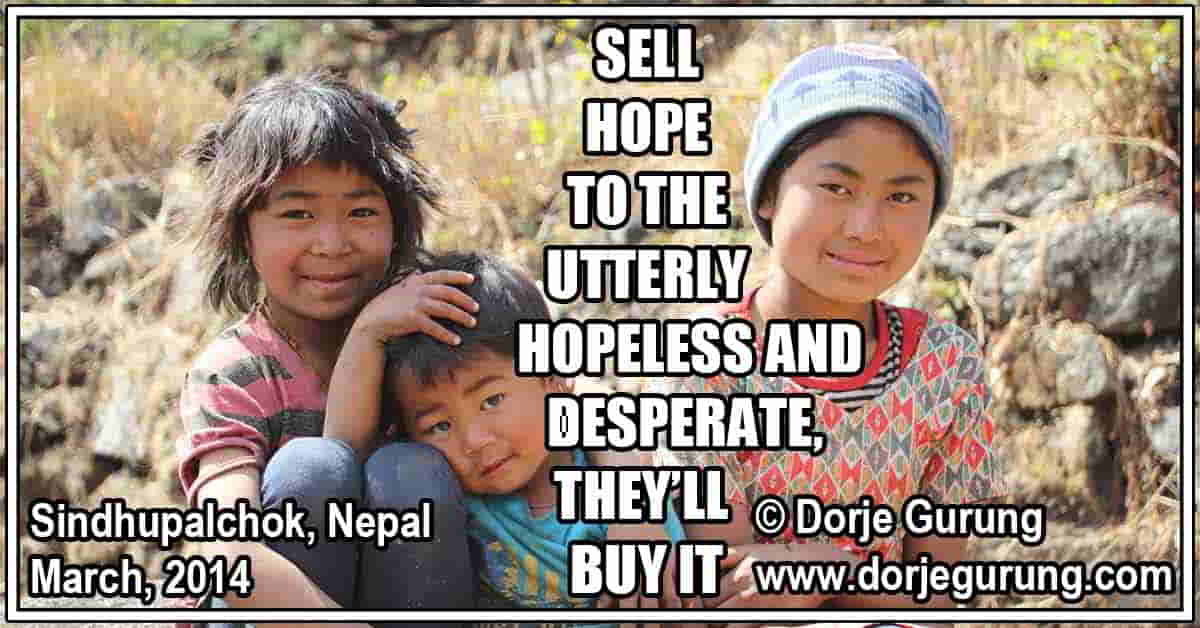Sell hope to the utterly hopeless and desperate, they’ll buy it. Unless you have experienced extended or prolonged despair or, worse, utter hopelessness, you cannot imagine what that is like.
But, in Nepal, I have met many — at bars and restaurant seated around tables or standing next to the bar with drinks in hand, for example — who express incredulity at the “stupidity” of all those Nepalis that fall prey to human traffickers.
“Everyone knows about those scams! The papers and TVs are always covering those stories! And yet,” they bemoan, taking a sip from their beer glass, “Nepalis keep signing up for such ‘opportunities of a life-time’ and then get stranded in some God-forsaken place, or get cheated out of their job or salary etc. and thus fall victim to traffickers.”
I have heard and read stories of desperate Nepalis. I have also met some desperate fellow Nepalis. I have seen and heard how they live and what their lives are like. It’s partly because of that that I understand.
The other reason I understand them is that I also know what poverty is like, having experienced it as a young child growing up in Nepal. During the lockdown, I was thinking of those who must be living the way my family had when we lived in Pokhara and how they must be suffering.
We lived in one- or two-room accommodations, with no indoor plumbing or bathrooms etc. We moved three times and the two or more storey houses we lived in were filled with other tenants like us. However, we had just one shower room, an outhouse, and a communal tap all at the back of the house.
If you have never had experiences with such living conditions, you have little to no idea about the challenges faced by those living in poverty during these times of the coronavirus lockdown.
I also know about despair, about depths of despair, having experienced it during my traumatic twelve-day incarceration in a Qatari jail seven years ago. Unless you have gotten to a point where you felt you had reached bottom, the very bottom, and then even the bottom is pulled from under you, you have no idea what that is like. In that state, any hope, any ray of hope you reach out to and buy into.
There was a even a point during my time in jail when I was overcome with a sense of utter hopelessness, which is something I am confessing to for the first time here (the details of which will have to remain the subject of another blog post altogether). When that happens, it cripples you mentally and emotionally. You can’t think straight, for example, and you put yourself at the complete mercy of another person. Whatever that person says, you believe, or whatever that person asks you to do, you do, and I am NOT exaggerating.
And now, during these uncertain and stressful times of the coronavirus pandemic, I am sure hundreds of thousands in the country are suffering from just that: utter and complete hopelessness. The poor have most likely been the hardest hit.
And in a country where most systems are set up to exploit the weak, the vulnerable, and the marginalized, how many are — and in the coming weeks and months will be — sold false hopes and made to surrender what little is left of themselves?
According to this article in the Nepali Times, some already have. Here’s a quote from it:
“Some of the girls, especially from poorer families, have been lured into seeking jobs, and some have even fallen prey to labour and sexual exploitation, the survey by the Room To Read literacy group has shown.”
Given the complete ineptitude of the government and the overabundance of Nepalis ready and keen to exploit fellow Nepalis, especially females, that will only continue to increase, unfortunately, just as it did in the aftermath of the 2015 Megaquakes.
Regardless, if you have never experienced utter hopelessness, count yourself lucky. Equally, don’t judge others for their decisions and choices made under those circumstances. You really don’t know what it’s like. Take it from me — I know. I have experienced it and have been tricked by it abeit for only a short duration.

